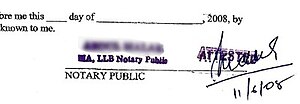 Image via Wikipedia
Image via WikipediaIs it required that an agreement be notarized involving real property in order that it can be enforced? Stated otherwise, can you enforced a private agreement involving a piece of land?
The above issues were settled by the Supreme Court in its latest Decision (as of this writing) in ESTATE OF PEDRO C. GONZALES and HEIRS OF PEDRO C. GONZALES vs. THE HEIRS OF MARCOS PEREZ, G.R. No. 169681 promulgated last November 5, 2009.
In the above-cited case, a deed of sale was executed covering a real property but the same was not notarized. When the parties to the said deed of sale both died, the heirs representing the vendee sought for the reconveyance of the sold property but the heirs representing the vendor refused.
The trial court ruled that since the deed of sale was not notarized, the same is considered void and of no effect. The said ruling was reversed by the Court of Appeals which ruled that a sale of real property, though not consigned in a public instrument, is nevertheless valid and binding among the parties and that the form required in Article 1358 of the Civil Code is not essential to the validity or enforceability of the transactions but only for convenience.
The issue of whether an agreement which is not notarized covering a real property is valid or not is a common talk especially among real estate practitioners who consider the transaction as null and void, as what the trial court did in this case.
In resolving the issue, the Supreme Court agreed with the Court of Appeals. The SC said that Article 1358 of the Civil Code enumerates the acts and contracts that should be embodied in a public document, to wit:
Art. 1358. The following must appear in a public document:
(1) Acts and contracts which have for their object the creation, transmission, modification or extinguishment of real rights over immovable property; sales of real property or of an interest therein are governed by Articles 1403, No. 2 and 1405;
(2) The cession, repudiation or renunciation of hereditary rights or of those of the conjugal partnership of gains;
(3) The power to administer property, or any other power which has for its object an act appearing or which should appear in a public document, or should prejudice a third person; and
(4) The cession of actions or rights proceeding from an act appearing in a public document.
All other contracts where the amount involved exceeds five hundred pesos must appear in writing, even a private one. But sales of goods, chattels or things in action are governed by Articles 1403, No. 2 and 1405.
On the other hand, the SC said that pertinent portions of Article 1403 of the Civil Code provide as follows:
Art. 1403. The following contracts are unenforceable, unless they are ratified:
x x x x
(2) Those that do not comply with the Statute of Frauds as set forth in this number. In the following cases an agreement hereafter made shall be unenforceable by action, unless the same, or some note or memorandum thereof, be in writing, and subscribed by the party charged, or by his agent; evidence, therefore, of the agreement cannot be received without the writing, or a secondary evidence of its contents:
(a) An agreement that by its terms is not to be performed within a year from the making thereof;
x x x x
(e) An agreement for the leasing for a longer period than one year, or for the sale of real property or of an interest therein; x x x[27]
Under Article 1403(2), the sale of real property should be in writing and subscribed by the party charged for it to be enforceable. In the present case, the deed of sale is in writing and subscribed by the vendor and his wife; hence, it is enforceable under the Statute of Frauds.
However, not having been subscribed and sworn to before a notary public, the deed of sale is not a public document and, therefore, does not comply with Article 1358 of the Civil Code.
Nonetheless, it is a settled rule that the failure to observe the proper form prescribed by Article 1358 does not render the acts or contracts enumerated therein invalid. It has been uniformly held that the form required under the said Article is not essential to the validity or enforceability of the transaction, but merely for convenience.
The SC said that a sale of real property, though not consigned in a public instrument or formal writing, is, nevertheless, valid and binding among the parties, for the time-honored rule is that even a verbal contract of sale of real estate produces legal effects between the parties. Stated differently, although a conveyance of land is not made in a public document, it does not affect the validity of such conveyance. Article 1358 does not require the accomplishment of the acts or contracts in a public instrument in order to validate the act or contract but only to insure its efficacy.





What then is the effect, if any, of failure to have the deed notarized?
ReplyDeleteBased on the decision, it is still valid especially between the parties. However, in order to convey the realty, notarization is a requirement.
ReplyDeleteGreat article you have posted. Enjoyed reading here, Thanks!
ReplyDeletereal estate ph